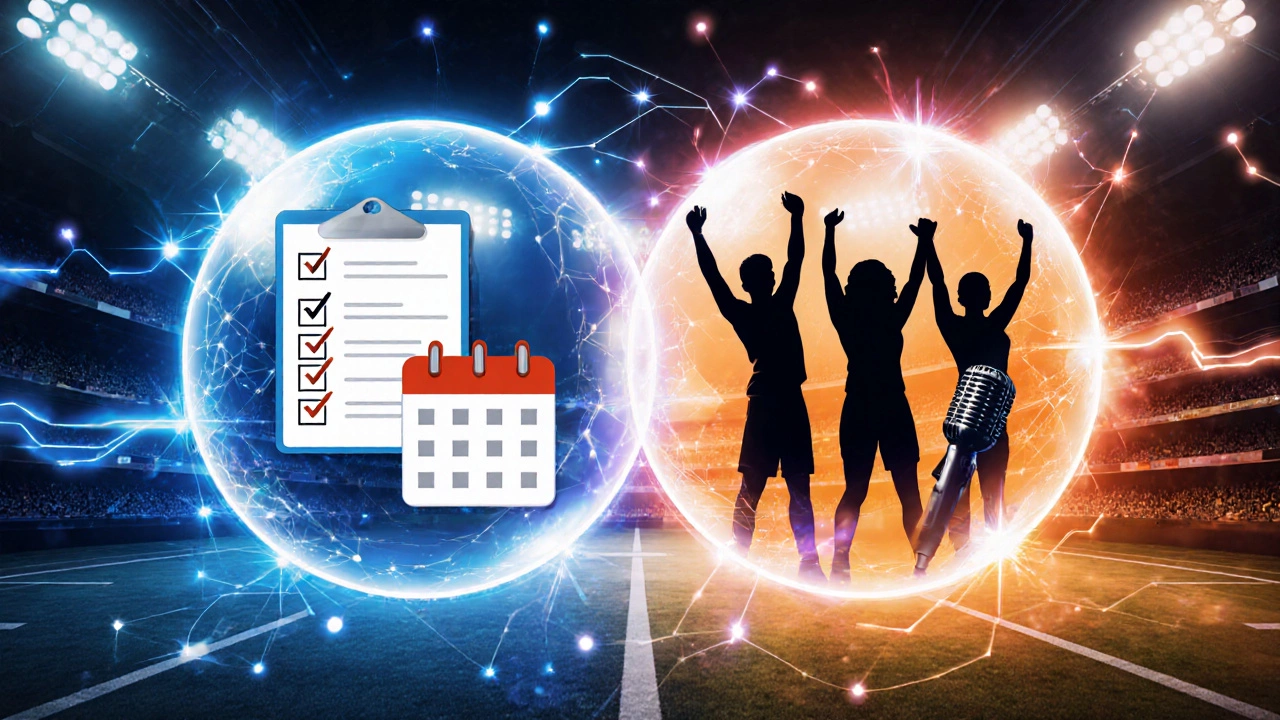Personality Type Competitive Spirit Analyzer
Your Competitive Spirit Profile
Type A
High time-consciousness and ambition. Excels in short-term bursts and fast-paced environments.
High Stress Tolerance Fast ExecutionHigh Conscientiousness
Excellent organization and persistence. Thrives in structured, long-term projects.
Detail-Oriented Consistent OutputAchievement Motivation
Driven by goal-oriented performance and recognition. Strategic planner and self-rewarder.
Goal Focus Recognition SeekerGrit & Growth Mindset
Resilient and adaptable. Maintains endurance through setbacks and learns from failures.
Perseverance Learning OrientationKey Takeaways
- People with high competitive spirit tend to score better in exams and sports.
- TypeA, high Conscientiousness, and strong Achievement Motivation are the top drivers.
- Grit and a Growth Mindset keep the fire alive when setbacks appear.
- Understanding your dominant traits helps you tailor study habits and goal‑setting.
- Mixing traits - like TypeA drive with a Growth Mindset - yields the most sustainable success.
Ever wonder why some people seem born to chase trophies, ace exams, or dominate boardrooms while others are content staying in the background? The answer lies in the mix of personality traits that fuel a competitive spirit a persistent drive to outperform peers and achieve top rankings. In this article we’ll break down the most influential personality types, show how they differ, and give you practical tips to harness the right mix for your own goals.
What Do We Mean by “Competitive Spirit”?
Before we dive into types, let’s nail down the definition. A competitive spirit the inner urge to measure oneself against others and strive for the best outcome isn’t just about bragging rights. It’s linked to higher task engagement, better stress management, and clearer goal‑setting. Psychologists measure it with scales that ask how much people enjoy challenges, how they react to winning or losing, and whether they set stretch goals.
Big Five Lens: Which Trait Packs the Most Punch?
The most widely accepted personality framework is the Big Five personality traits a five‑factor model that includes Openness, Conscientiousness, Extraversion, Agreeableness, and Neuroticism. Research from the University of Michigan (2023) shows that two of these factors correlate most strongly with a competitive edge:
- Conscientiousness - the ability to stay organized, plan ahead, and follow through.
- Extraversion - the tendency to seek social stimulation and thrive in competitive environments.
While Extraversion gives you the confidence to battle it out in group settings, Conscientiousness provides the discipline you need to out‑work rivals over weeks or months.
TypeA vs. TypeB: The Classic Duel
When most people think of “go‑getters,” they picture the classic TypeA personality a fast‑paced, highly achievement‑oriented temperament. TypeA people are:
- Highly time‑conscious and often set tight deadlines for themselves.
- Quick to perceive competition as a personal challenge.
- Prone to stress if they fall behind.
In contrast, TypeB personality a relaxed, laid‑back temperament that prefers steady progress over high‑octane pressure tends to avoid intense rivalry. Studies in the Journal of Personality (2022) found that TypeA individuals score, on average, 15% higher on competitive‑spirit scales than TypeB counterparts.

Achievement Motivation: The Engine Under the Hood
Beyond broad trait labels, psychologists talk about achievement motivation the internal drive to achieve success, master tasks, and gain recognition. It splits into two sub‑components:
- **Approach orientation** - the desire to attain positive outcomes (e.g., winning a scholarship).
- **Avoidance orientation** - the fear of failure, which can also spur effort but often leads to anxiety.
High approach orientation combined with lower avoidance yields the most durable competitive spirit, because the focus stays on growth rather than fear.
Grit and Growth Mindset: Staying Power When the Going Gets Tough
Two concepts have taken the education world by storm: grit the perseverance and passion for long‑term goals and growth mindset the belief that abilities can improve with effort and learning. Both act as buffers when competitive pressure spikes.
- Grit keeps you grinding through repetitive practice, even after early setbacks.
- A growth mindset reframes failures as learning opportunities, preventing burnout.
Data from a 2024 longitudinal study of engineering students showed that those scoring high on both grit and growth mindset were 22% more likely to finish in the top 10% of their class.
Comparison Table: Personality Profiles With the Highest Competitive Edge
| Profile | Key Trait(s) | Typical Strengths | Potential Pitfalls | Best Competitive Arenas |
|---|---|---|---|---|
| TypeA | Time pressure, high ambition | Rapid execution, goal focus | Stress, burnout | Exam blitzes, sales targets |
| High Conscientiousness | Organization, persistence | Consistent output, detail‑oriented | Perfectionism | Research projects, coding marathons |
| High Achievement Motivation | Goal‑oriented, approach focus | Strategic planning, self‑reward | Over‑competition | Leadership contests, entrepreneurship |
| Grit‑Driven | Long‑term perseverance | Endurance, resilience | Stubbornness | Long‑duration exams (NEET, IIT JEE) |
| Growth‑Mindset | Learning belief | Adaptability, rapid skill acquisition | Under‑estimation of initial ability | New skill competitions, start‑ups |
How to Identify Your Dominant Competitive Traits
Self‑assessment can be as simple as a few questions:
- Do you feel restless when a deadline is far away? (TypeA & high Conscientiousness)
- Do you thrive on public recognition for achievements? (Achievement Motivation)
- When faced with a tough problem, do you keep trying until you solve it, or do you look for a shortcut? (Grit vs. Growth Mindset)
- Do you enjoy brainstorming with large groups or prefer solo deep work? (Extraversion component of competitive spirit)
Score yourself 1‑5 on each item. The highest clusters point to the personality profile that fuels your competitive edge.

Practical Tips to Boost Your Competitive Spirit
- Set micro‑goals. Break big milestones into daily wins. This mimics TypeA’s love for ticking boxes while keeping stress manageable.
- Track progress visually. Use charts or habit trackers. Conscientious types gain motivation from visible data.
- Celebrate effort, not just outcome. Reinforce a Growth Mindset by rewarding the process.
- Practice deliberate failure. Simulate low‑stakes competitions where you purposefully miss a target, analyze why, and improve. This builds grit.
- Pair up with a complementary partner. If you’re high on Conscientiousness but low on Extraversion, a socially active teammate can push you into team‑based contests.
When Competitive Spirit Becomes a Liability
Too much rivalry can tip into unhealthy territory:
- Chronic stress leading to burnout (common in extreme TypeA).
- Ethical shortcuts - cheating or sabotaging peers.
- Social isolation when you view everyone as a competitor.
Balance is key. Regular reflection, mindfulness breaks, and a supportive network keep the fire bright without scorching the brain.
Future Trends: Competitive Spirit in a Digital Age
AI‑driven learning platforms now personalize challenges based on your personality profile. If your data shows high Conscientiousness, the system will serve longer, structured problem sets; if you score high on Extraversion, it will suggest collaborative simulations and leaderboards.
Understanding your core traits will let you pick the right platform and stay ahead of the curve.
Frequently Asked Questions
Can anyone develop a stronger competitive spirit?
Yes. While genetics set a baseline, habits like goal‑setting, deliberate practice, and mindset training can significantly boost the traits linked to competition.
Is a TypeA personality always the best for exam preparation?
Not necessarily. TypeA excels at short, intense study bursts, but for long‑term courses like NEET or IIT JEE, adding grit and a growth mindset prevents burnout.
How does grit differ from perseverance?
Perseverance is the act of continuing despite difficulty; grit adds a passionate, long‑term commitment to a specific goal.
Can a growth mindset replace the need for high achievement motivation?
They complement each other. A growth mindset shapes how you view effort, while achievement motivation supplies the directional push toward specific targets.
What simple daily habit can boost my competitive edge?
Spend five minutes each morning writing a micro‑goal for the day and a brief reflection on yesterday’s win. This tiny routine aligns TypeA focus with growth‑mindset learning.
